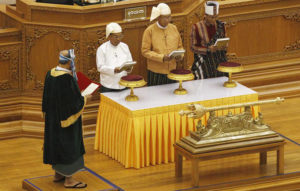The State Department has named Burma as one of the world’s worst human trafficking offenders, and it removed Thailand from the list, citing progress in cracking down on forced labor in the seafood industry.

The annual Trafficking in Persons Report released Thursday is watched closely by the countries clustered at the bottom. It is viewed as a black mark on their international reputations and can have financial consequences. U.S. law places restrictions on non-humanitarian aid to countries with the worst records.
Secretary of State John F. Kerry called the report “a clarion call to each of us to do all we can to eradicate these horrors.”
The report said human trafficking in Thailand remains a significant problem. Workers in the seafood industry are forced onto fishing boats for years at a time to toil 18 to 20 hours a day, the report said. They are sometimes beaten and drugged to work longer, and some have been killed for trying to escape.
But the report said the government is making progress against the trade. It has increased the number of investigations and prosecutions of traffickers, including ship owners and captains, and closed down guilty firms.
Thailand’s upgrade was welcomed by the ruling military junta. Bangkok complained bitterly last year, when it was listed as a Tier 3 country, the lowest ranking possible, which is reserved for countries that are doing little or nothing to deter human trafficking. This year, it was bumped up half a step to a Tier 2 “watchlist” for countries that do not meet the minimum standards but are trying to curb the practice.
Thailand illustrates the potential geopolitical ramifications of the report. Relations between Thailand and the United States have been uneasy since the military seized power in a 2014 coup. But now, Washington wants to improve ties to counter China’s growing regional influence and to build a unified regional front that will challenge Beijing’s territorial claims on man-made islands in the South China Sea.
